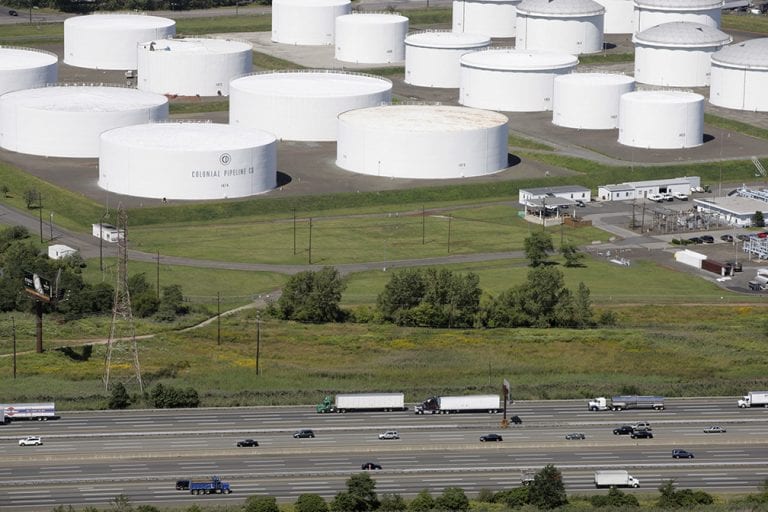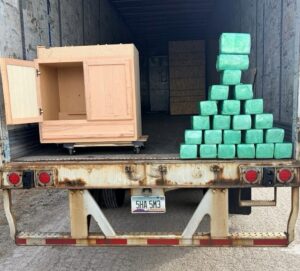WASHINGTON — In the wake of a May 8 cyberextortion attempt on the Colonial Pipeline that resulted in the halting of all pipeline operations, the U.S. Department of Transportation’s Federal Motor Carrier Safety Administration (FMCSA) on May 9 issued a temporary hours-of-service exemption in an effort to avoid disruption to the nation’s fuel supply. The exemption will remain in effect until June 8.
The Colonial Pipeline transports gasoline and other fuel through 10 states between Texas and New Jersey. It delivers roughly 45% of fuel consumed on the East Coast, according to the company.
The temporary exemption from Parts 390 through 399 of the Federal Motor Carrier Safety (FMCSRs) applies to motor carriers and drivers providing direct assistance supporting emergency relief efforts transporting gasoline, diesel, jet fuel and other refined petroleum products to Alabama, Arkansas, District of Columbia, Delaware, Florida, Georgia, Kentucky, Louisiana, Maryland, Mississippi, New Jersey, New York, North Carolina, Pennsylvania, South Carolina, Tennessee, Texas and Virginia.
According to FMCSA, “direct assistance” ends when the driver or vehicle is used in interstate commerce to “transport cargo or provide services that are not in support of emergency relief efforts related to the shortages of gasoline, diesel, jet fuel and other refined petroleum products due to the shutdown, partial shutdown, and/or manual operation of the Colonial pipeline system in the affected states, or when the motor carrier dispatches a driver or commercial motor vehicle to another location to begin operations in commerce.”
When direct assistance ends, the motor carrier and driver are once again subject to the requirements of 49 CFR Parts 390 through 399; however, a driver can return empty to the carrier’s terminal or normal reporting location without complying with Parts 390 through 399. In addition, the exemption states, “When a driver is moving from emergency relief efforts to normal operations a 10-hour break is required when the total time a driver operates conducting emergency relief efforts, or a combination of emergency relief and normal operation, equals 14 hours.”
On Saturday, May 8, Colonial Pipeline reported it had been hit by a ransomware attack and had halted all pipeline operations to deal with the threat. Two people close to the investigation said that the shutdown had been carried out by a criminal gang known as DarkSide that cultivates a “Robin Hood” image of stealing from corporations and giving a cut to charity.
The average U.S. price of regular-grade gasoline has jumped 6 cents over the past two weeks, to $3.02 per gallon, which is $1.05 higher than it was a year ago. Those year-ago numbers are skewed somewhat because the nation was going into lockdown due to the pandemic.
Futures for crude and fuel, prices that traders pay for contracts for delivery at some point in the future, typically begin to rise each year as the driving season approaches. The price consumers pay at the gas pump tends to follow.
If the shutdown of the Colonial Pipeline continues, it could exacerbate upward pressure on fuel prices.
Futures jumped 1.5% Monday, May 10, the largest movement in about a week, with the potential for disruptions in fuel delivery still unknown.
Colonial is in the process of restarting portions of its network. It said Sunday, May 9, that its main pipeline remained offline, but that some smaller lines were operational.
For the moment, seesawing prices may be felt mostly within the energy industry as suppliers adjust to potential shifts in the flow of gasoline.
More fuel may be sourced from East Cost refiners, J.P. Morgan said Monday, May 10, and an extended outage along the Colonial Pipeline would force suppliers to seek fuel from the Midwest, rather than the Gulf.
The Associated Press contributed to this report.
The Trucker News Staff produces engaging content for not only TheTrucker.com, but also The Trucker Newspaper, which has been serving the trucking industry for more than 30 years. With a focus on drivers, the Trucker News Staff aims to provide relevant, objective content pertaining to the trucking segment of the transportation industry. The Trucker News Staff is based in Little Rock, Arkansas.











